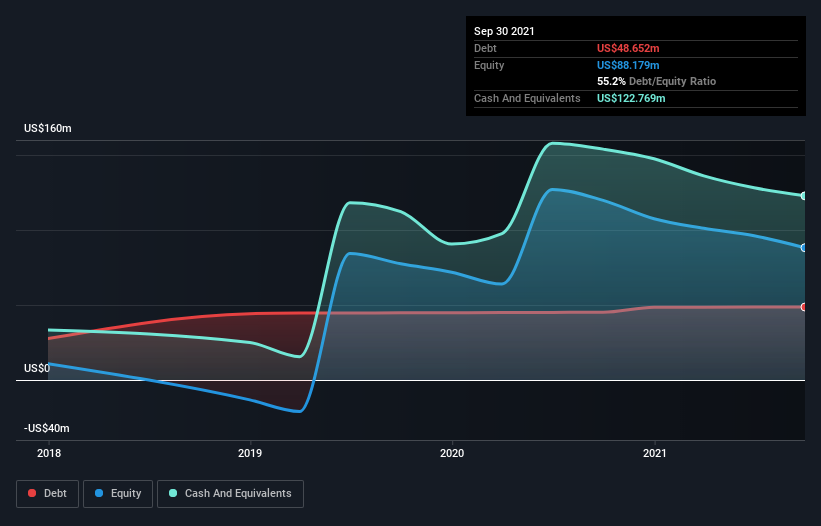Is Silk Road Medical (NASDAQ:SILK) A Risky Investment?
The external fund manager backed by Berkshire Hathaway's Charlie Munger, Li Lu, makes no bones about it when he says 'The biggest investment risk is not the volatility of prices, but whether you will suffer a permanent loss of capital.' It's only natural to consider a company's balance sheet when you examine how risky it is, since debt is often involved when a business collapses. We note that Silk Road Medical, Inc (NASDAQ:SILK) does have debt on its balance sheet. But the real question is whether this debt is making the company risky.
When Is Debt A Problem?
Debt is a tool to help businesses grow, but if a business is incapable of paying off its lenders, then it exists at their mercy. Part and parcel of capitalism is the process of 'creative destruction' where failed businesses are mercilessly liquidated by their bankers. However, a more common (but still painful) scenario is that it has to raise new equity capital at a low price, thus permanently diluting shareholders. Of course, debt can be an important tool in businesses, particularly capital heavy businesses. The first thing to do when considering how much debt a business uses is to look at its cash and debt together.
View our latest analysis for Silk Road Medical
How Much Debt Does Silk Road Medical Carry?
As you can see below, at the end of September 2021, Silk Road Medical had US$48.7m of debt, up from US$45.2m a year ago. Click the image for more detail. But it also has US$122.8m in cash to offset that, meaning it has US$74.1m net cash.
How Strong Is Silk Road Medical's Balance Sheet?
The latest balance sheet data shows that Silk Road Medical had liabilities of US$20.9m due within a year, and liabilities of US$56.4m falling due after that. Offsetting these obligations, it had cash of US$122.8m as well as receivables valued at US$11.0m due within 12 months. So it actually has US$56.4m more liquid assets than total liabilities.
This short term liquidity is a sign that Silk Road Medical could probably pay off its debt with ease, as its balance sheet is far from stretched. Simply put, the fact that Silk Road Medical has more cash than debt is arguably a good indication that it can manage its debt safely. There's no doubt that we learn most about debt from the balance sheet. But ultimately the future profitability of the business will decide if Silk Road Medical can strengthen its balance sheet over time. So if you want to see what the professionals think, you might find this free report on analyst profit forecasts to be interesting.
Over 12 months, Silk Road Medical reported revenue of US$94m, which is a gain of 30%, although it did not report any earnings before interest and tax. With any luck the company will be able to grow its way to profitability.
So How Risky Is Silk Road Medical?
We have no doubt that loss making companies are, in general, riskier than profitable ones. And in the last year Silk Road Medical had an earnings before interest and tax (EBIT) loss, truth be told. Indeed, in that time it burnt through US$44m of cash and made a loss of US$52m. While this does make the company a bit risky, it's important to remember it has net cash of US$74.1m. That means it could keep spending at its current rate for more than two years. With very solid revenue growth in the last year, Silk Road Medical may be on a path to profitability. Pre-profit companies are often risky, but they can also offer great rewards. There's no doubt that we learn most about debt from the balance sheet. However, not all investment risk resides within the balance sheet - far from it. For example - Silk Road Medical has 3 warning signs we think you should be aware of.
Of course, if you're the type of investor who prefers buying stocks without the burden of debt, then don't hesitate to discover our exclusive list of net cash growth stocks, today.
Have feedback on this article? Concerned about the content? Get in touch with us directly. Alternatively, email editorial-team (at) simplywallst.com.
This article by Simply Wall St is general in nature. We provide commentary based on historical data and analyst forecasts only using an unbiased methodology and our articles are not intended to be financial advice. It does not constitute a recommendation to buy or sell any stock, and does not take account of your objectives, or your financial situation. We aim to bring you long-term focused analysis driven by fundamental data. Note that our analysis may not factor in the latest price-sensitive company announcements or qualitative material. Simply Wall St has no position in any stocks mentioned.

